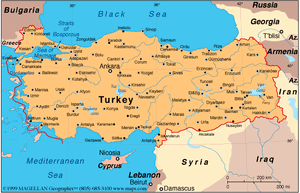Bartın River
| Author:Laxman Burdak, IFS (R) |
- For the river of same name see Bartın

Bartın River (Bartın Çayı), anciently known as Parthenius or Parthenios (Ancient Greek: Παρθένιος), is a small river in the east of the Black Sea Region of Turkey. Pliny has mentioned it as Parthenius. [1]
Variants
Course
Its source is in the Ilgaz Mountains, in Kastamonu Province and Karabük Province. The river flows to the north, passes through Bartın, and empties into the Black Sea near Boğaz village in a delta.
The last 14 kilometres on the Bartın River, between Bartın and the Black Sea coast, are navigable for vessels.
History
The Greek name is ancient, as the river is mentioned by Homer in the Iliad.[2] Because the ancient name sounds like Parthen- (Παρθέν-, ancient Greek for 'virgin' or 'purity'), ancient Greek authors fabled that it derived its name from the fact that Artemis, patron goddess of virgins, loved to bathe in its waters[3] or to hunt on its banks, or from the purity of its waters. The river has its sources on Mount Olgassys, and in its northwestern course formed the boundary between Paphlagonia and Bithynia. It empties itself into the Euxine (Black Sea) about 90 stadia west of Amastris.[4][5][6][7]
Mention by Pliny
Pliny[8] mentions....Beyond this river begins the nation of Paphlagonia1, by some writers called Pylæmenia2; it is closed in behind by the country of Galatia. In it are Mastya3, a town founded by the Milesians, and then Cromna4, at which spot Cornelius Nepos also places the Heneti5, from whom he would have us believe that the Veneti of Italy, who have a similar name, are descended. The city also of Sesamon, now called Amastris6, Mount Cytorus7, distant sixty-three miles from Tium, the towns of Cimolis8 and Stephane9, and the river Parthenius.10
1 Paphlagonia was bounded by Bithynia on the west, and by Pontus on the east, being separated from the last by the river Halys; on the south it was divided by the chain of Mount Olympus from Phrygia in the earlier times, from Galatia at a later period; and on the north it bordered on the Euxine.
2 In the Homeric catalogue we find Pylæmenes leading the Paphlagonians as allies of the Trojans; from this Pylæmenes the later princes of Paphlagonia claimed their descent, and the country was sometimes from them called Pylæmenia.
3 Suspected by Hardouin to have been the same as the Moson or Moston mentioned by Ptolemy as in Galatia.
4 It is mentioned by Homer, Il. ii. 855, as situate on the coast of Paphlagonia.
5 Strabo also, in B. xii., says that these people afterwards established themselves in Thrace, and that gradually moving to the west, they finally settled in the Italian Venetia, which from them took its name. But in his Fourth Book he says that the Veneti of Italy owe their origin to the Gallic Veneti, who came from the neighbourhood known as the modern Vannes.
6 This city, ninety stadia east of the river Parthenius, occupied a peninsula, and on each side of the isthmus was a harbour. The original city, as here mentioned, seems to have had the name of Sesamus or Sesamum, and it is spoken of by that name in Homer, Il. ii. 853, in conjunction with Cytorus. The territory of Amastris was famous for its growth of the best box-wood, which grew on Mount Cytorus. The present Amasra or Hanasserall occupies its site.
7 See the last Note.
8 Otherwise called "Cinolis." There is a place called Kinla or Kinoglu in the maps, about half-way between Kerempeh and Sinope, which is the Kinuli of Abulfeda, and probably the Cirolis or Cimolis of the Greek geographers.
9 The modern Estefan or Stefanos.
10 Now known by the name of Bartin, a corruption of its ancient appellation.
References
- ↑ Pliny.vi.2
- ↑ Homer. Iliad. Vol. 2.854.
- ↑ Scymn. 226, foll.
- ↑ Hes. Th. 344; Xenoph. Anab. 5.6.9, 6.2.1; Herodotus. Histories. Vol. 2.104.
- ↑ Strabo. Geographica. Vol. xii. p.543. Page numbers refer to those of Isaac Casaubon's edition.
- ↑ Ptolemy. The Geography. Vol. 5.1.7.
- ↑ Arrian, Peripl. p. 14; Ovid Pont. 4.10 49; Amm. Marc. xxii 9
- ↑ Natural History by Pliny Book VI/Chapter 2
Back to Rivers

